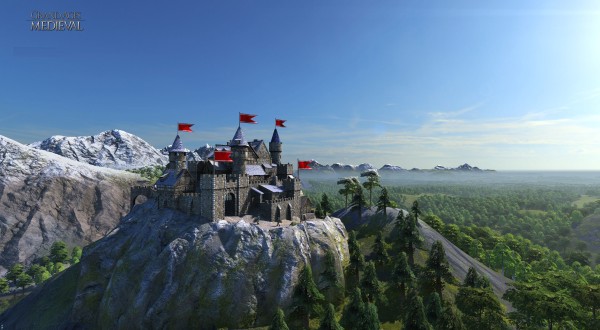Laying siege to the console castle
It’s perhaps not the sexiest impression to take from a preview, but what impressed us most about Grand Ages: Medieval was how its developer, Gaming Minds, has managed to take something so outwardly complicated and make it so apparently simple. In the hour we spent being talked through our hands-off demo by creative director Daniel Dumont, we watched from a god’s-eye-view as settlers, trade caravans and soldiers by the hundred scurried across the crisscrossed roads of late game Europe, peddling wares and besieging towns seemingly completely under their own steam. Sometimes Dumont would zoom in to show us something, like what was in the back of a trundling trade cart, but for the most part, Grand Ages’ populace seemed like model citizens. By this we mean they weren’t pestering us.
The reason for the streamlining is clear: in the latter stages of this expansive empire sim – in which Dumont is controlling dozens of towns, cities and trade routes – fussing over each one like an interfering council jobsworth would be completely overwhelming. While Dumont is hands-on with his people in his first settlement – choosing a site for a new town based on the abundance of nearby resources and proximity to other established, neutral trading partners – once his empire stretches from the shores of Britain to those of North Africa, the robots take over to maintain order.
And while it may be that we’ve only been around the game for a short time (or that Dumont really knows what he’s doing), the orderly nature of Grand Ages appealed to the benevolent dictators in us. Where many other RTS games (and console RTS in particular) put a strong emphasis on building up a mighty host and steamrolling over someone else’s, Grand Ages seems less about wanton destruction and more about bringing Europe and the top tip of Africa round to your way of thinking (through trade, diplomacy or sieges).
So, if you opt to raise the banners and march off to conquer an enemy settlement, you’ll have to muster a siege force. But here’s the thing: because soldiers in Grand Ages require food (you know, like real soldiers do), it’s bad practice to have them just sitting about in towns when there isn’t a war on. So, you need to spread your troops across your empire and bring them together when you need them to go and sack something. All this takes time. Finally, once you manoeuvre your army into position, nothing gets set on fire – the AI takes your army, pits it against the defenders’ army, and the winner gets the town. As warfare goes, it’s quite peaceful, actually.
This isn’t to say that Grand Ages looks easy. Games under the standard starting conditions are protracted affairs (although you can customise a whole host of options, like starting wealth, AI competence, frequency of natural disasters and so on to create bespoke difficulty settings), and though your enemies all start at the same level as you with just a single settlement, they’ll be working tirelessly under the fog of war to ally themselves with (or capture) their own towns, until you eventually bump into each other somewhere in the middle. Again, the goal (under normal conditions) isn’t total annihilation of all who dare oppose you, but to amass a certain number of in-game victory points by researching new technologies and expanding your rule the furthest.
The illusion of ease that Dumont demonstrated with Grand Ages might dissolve when we first get our hands on it (there was a brief allusion to the kinds of supply-and-demand snowballing disasters that can occur among closely connected towns – one coastal village stops producing salt, the next can’t cure its meat, the next can’t feed its soldiers, and suddenly it’s famine and desertion all round). But, from what we’ve seen, Grand Ages is a smart RTS with a depth of easily interlocking systems that – perhaps most importantly – bode well for a potentially fiddlier console port.

